Posted : June 7, 2021
Our blog is chock full of great ideas for fun things to see and do in York Durham and Headwaters. We are always adding new content and updating old posts, but sometimes you might stumble upon something from our vault. If this article has inspired you to hit the road, be sure to double-check that the featured stops in this post are still welcoming visitors.
One of the most quintessential features of any small town worthy of the moniker is an historic building that brings people of the community together in one way or another. Even better is when that historic building still performs the same function and fulfills the same need it did all those years ago. These buildings hold a vital tether between people of the past and the present, upholding for future generations the history of the place it calls home. (Jeepers, we’re getting all misty-eyed and sentimental here… and we love it!)
Welcome to the village of Tyrone. Just north of Bowmanville in Durham Region, this picturesque little hamlet is home to Tyrone Mills, a 175-year-old working water-powered mill that offers hand-crafted goods, local preserves, lumber milled the old-fashioned way, pressed apple cider, artisan products, and an abundance of historic country charm.

Oh, and donuts. Famous donuts! More on that in a bit…
Drive Clarington’s quaint country roads into the village of Tyrone, and if you’re not ready for it, you might actually drive past the mill. So quiet are its surroundings that you wouldn’t think a thriving tourist destination could exist here. That’s what makes it so charming. Step out of your modern vehicle, and you might as well have stepped into a little piece of the past. The mill was built in 1846 as a flour mill by immigrants from Northern Ireland, and still retains the majority of its inner machinery, which remains operational after nearly two centuries. But beware the original features, lovely historic atmosphere and maze-like layout—one can easily lose the time in this place.

In its heyday, the mill was shipping flour to both the United States and Great Britain while also maintaining local trade. As the flour industry changed between 1885 and 1890, Tyrone Mill became a feed mill, grinding feed for animals, and remained this way until the late 1950s. “This is when my predecessor bought it and realized he was likely going to starve if he kept on with a declining industry,” owner Robert Shafer recalls. “So, he put in a saw mill and all the wood working that went with it.” Lumber is what kept Tyrone Mills alive until Robert purchased the business in 1979. “When I first bought it, the feed mill was still in existence,” he says. “But I literally made $50 the first year at it, and it was obvious there was no future in feed. I concentrated on the cutting of logs and we got into selling lumber and all of that.”
As the business grew and Robert began considering expansion, he noticed that there were many apples growing in the surrounding areas that no one was pressing for juice. The next venture, naturally, was to add the apple cider business.
Then came the donuts. Oh, the donuts! These fresh, flavourful delights infused with sweet cider come plain or dusted in cinnamon sugar, and harken back to a simpler time when handmade was a way of life. If you’re a Clarington local, chances are you’ve had more than your fair share of Tyrone Mills’ famous cider donuts. “The best thing I ever did was put in that donut machine,” Robert states. “When we did that, it really opened the mill up to the public. People come from all over to get them, and if it’s a busy day we never turn the machine off. We just keep cranking them out.”
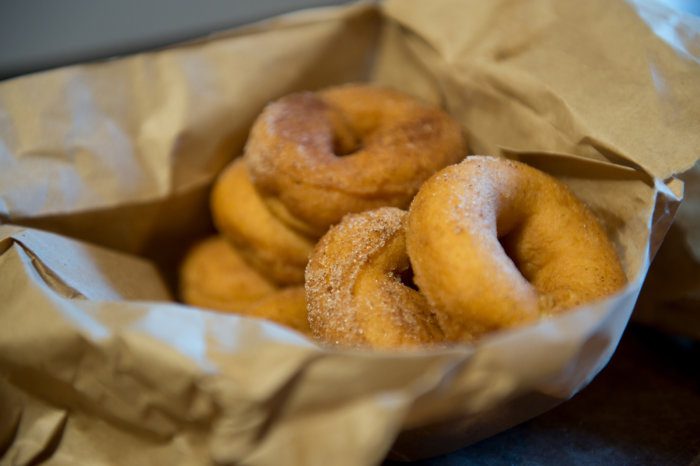
Today, Tyrone Mills is still water-powered, and still offers lumber milled onsite, concentrating on cedar, pine and specialty products. After having its millstones reinstalled 25 years ago, it is capable of milling various types of whole grain flour and does so in modest quantities. But with the changing times, Robert has found that his customer base has become increasingly tourism-related. “We’re probably more of a tourist destination today than we are anything else,” he says. To satisfy the demand of this new demographic of visitor, Tyrone Mills has branched into local artisan products like jams, soaps, honey, maple syrup and ice cream, as well as making their own jams and soup mixes.
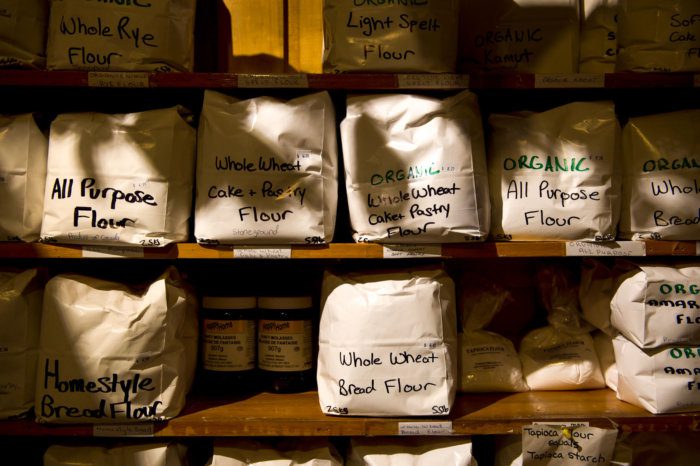
“At least 90% of what we sell is sourced locally, or is at the very least Canadian-made,” Robert says. “It wasn’t necessarily by design, but it has definitely become that. The cheese is Empire Cheese from Campbellford and that’s because it’s a good cheese and it’s one of the last owned by the farmers’ co-op. The ice cream is Country Smith which is made just outside of Peterborough, the maple syrup people live up in Millbrook, and the bread is from a local gentleman who got into baking after being laid off due to COVID.”
He adds, “You form relationships with these people, talking about the kids and families, as well as the business. I find that if I’m supportive of my local suppliers, they’re supportive of me.”
Supporting local is something Robert is passionate about. Not only does Tyrone Mills regularly sponsor local youth sports and organizations, it is also one of the founding members of A Country Path, a group of local merchants that actively cross-promote one another in Clarington. “It’s kind of like rolling into town and asking a local where the best place to eat is,” he explains. “We know each other’s businesses and we are not going to send you somewhere that is going to be a bad reflection on us. It’s really worked. Cooperatively, we have been able to advertise and reach a bigger audience than we would have individually.”
It is the flexibility of Robert Shafer and his predecessors that has kept the mill going for 175 years. He says, “If you look at the history of the business, one of the reasons that this place has survived is because every business owner adapted the business to the changing economic climate of the time. Initially, it served the very local need of grinding grain for flour. Then as the flour business changed and local livestock increased, this place changed into the feed mill. Then as that business model began to fail, my predecessor got into the lumber business, and I got into the apple cider business. The future of this place, I think, is tourism. We are finding that people prefer to buy from us over the big stores.”
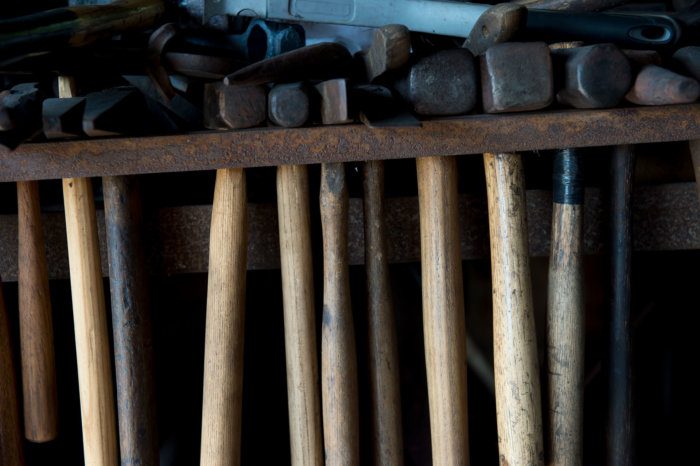
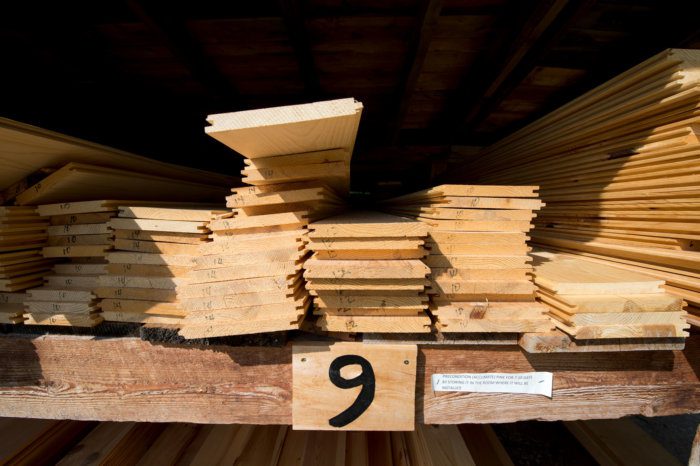
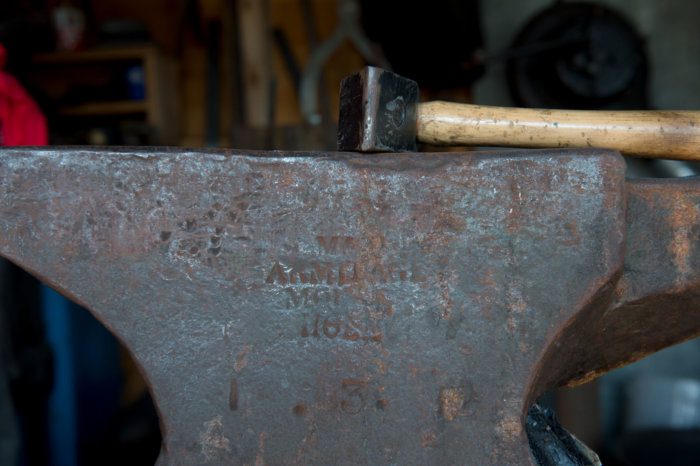
Always with a mind on evolution and “what’s next,” Robert and his staff have a few plans in various stages of implementation. Renovations are under way to upgrade prep space for the mill’s onsite pizza oven which, after an unfortunate delay due to COVID-19, will hopefully be up in a month or so. And Robert is also considering the possibility of turning the second floor of the mill into a working museum. “That’s where all the pulley machines and such are stored,” he says. “We’d love to create a historical display showcasing and interpreting the equipment. We have potential here, it just needs to be expanded on.”
Tyrone Mills Inc.
2656 Concession Rd. 7, Bowmanville
Story by Katherine Ryalen